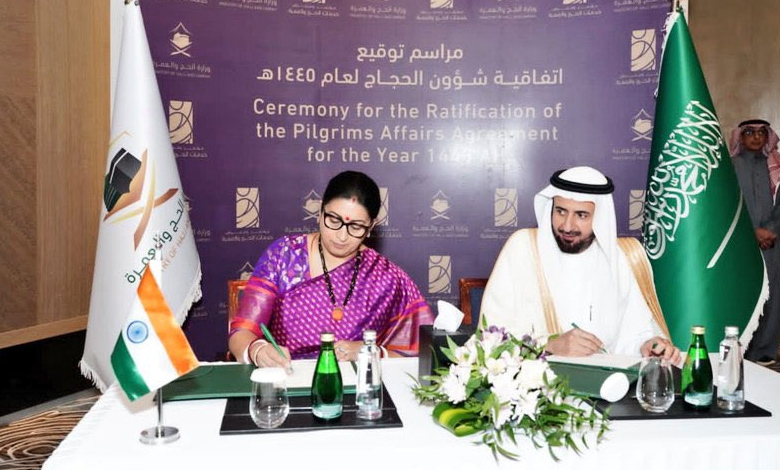New Delhi and Riyadh signed the Bilateral Haj Agreement 2024 on Sunday. Under the deal, a total quota of 1,75,025 pilgrims from India has been finalised for the upcoming annual Haj pilgrimage in 2024, according to an official statement.
India’s Minister of Minority Affairs Smriti Zubin Irani accompanied by MoS for External Affairs V Muraleedharan signed the bilateral agreement in a landmark move with Tawfiq bin Fawzan Al-Rabiah, the Saudi Minister for Hajj and Umrah, at Jeddah.
Out of a total quota of 1,75,025 pilgrims from India finalised, 1,40,020 seats have been reserved for pilgrims to proceed through the Haj Committee of India, amid 35,005 pilgrims allowed to proceed through private operators.
The Saudi side appreciated the Government of India’s digital initiatives in facilitating and promoting ease and convenience for Haj pilgrims by offering last mile information, according to the statement. In addition, the Ladies without Mehram (LWM) initiative was also lauded.
Indian government’s Ladies without Mehram (LWM) initiative explained
The government introduced the LWM category in Haj 2018 and since then there has been an emphasis on encouraging more and more women to apply under the initiative. Last year, a historical high of more than 4,000 female pilgrims successfully applied under the category.
Traditionally, a significant deterrent for increased participation of Muslim women had been their dependence on an accompanying male haji, or mehram, for performing the sacred religious pilgrimage. But this restriction came to an end a few years back.
The Indian government initially started to allow ladies of 45 years of age or above to apply for Haj without Mehram. Provision was made for eligible women to perform the pilgrimage under the LWM category in groups of 4.
Read More: Just 5 days remaining until 2023 Asian Cup kicks off in Qatar: Key details
Eventually, for the first time, the government in Haj 2023 allowed single eligible ladies to also apply under the initiative. The change resulted in an all-time high participation – over 4,000 successful female applicants, leading to gender inclusivity and greater confidence.


















